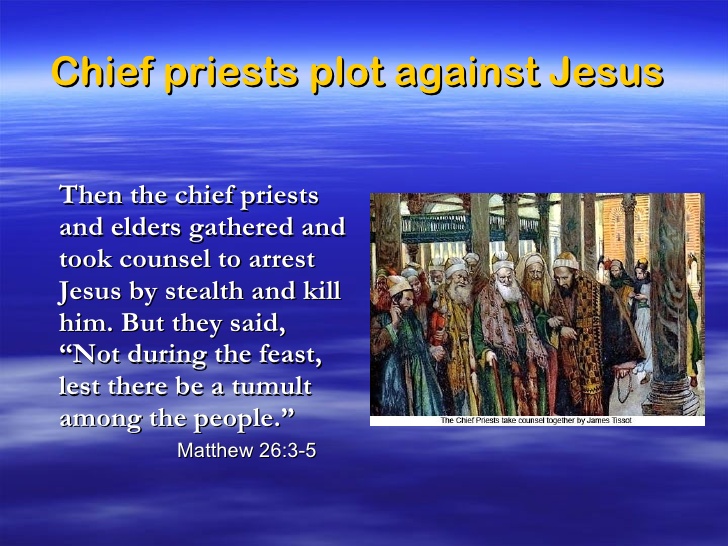The stage is set and the players are all in place for the arrest and crucifixion of Jesus, and His time on earth is drawing to a close.
The narrative of the death and sufferings of Christ is more detailed and fully recorded by all four gospels than any part of his history. The year of the redeemed had arrived, the seventy weeks determined were now accomplished, when transgression must be finished, reconciliation made, and an everlasting righteousness brought in, by the cutting off of Messiah the Prince, Dan. 9:24, 26.
Today’s message in chapter 26 consists of four parts, preliminaries to Christ’s sufferings:
- The previous notice given by him to his disciples, Mt. 26:1-2
- The rulers’ conspiracy against him, Mt. 26:3-5
- The anointing of Jesus at a supper in Bethany, Mt. 26:6-13
- Judas’s bargain with the priests to betray him, Mt. 26:14-16
Shockingly, Jesus predicts every detail of his sufferings, that they are right at the door of history – in fact, He said it would happen in just two days! Can you imagine?
Remember, all these events had been foreseen from eternity and He knowingly offered Himself as the Word became flesh for this very purpose: to give His life a ransom.
THE PROPHECY
Matthew 26:1-2, Jesus reminds His disciples of His coming suffering and crucifixion.
Now it came to pass, when Jesus had finished all these sayings, that He said to His disciples, “You know that after two days is the Passover, and the Son of Man will be delivered up to be crucified.”
“…when Jesus finished all these sayings” What sayings? Matthew 25:44-46 for context.
Jesus warned the multitudes about the corrupt religious leadership and He spoke to His disciples about things to come. Now, it was time for Jesus to fulfill His work on the cross. Thinking about the sufferings Christ endured – the tortures of the cross – gives great comfort and support to suffering believers in Him.
- “Having instructedhis disciples and the Jews by his many teachings, edified them by his example, convinced them by his miracles, he now prepares to redeem them by his blood!”
Jesus refuted their erroneous idea that it was impossible the Messiah should suffer. Christ, our Passover lamb, was sacrificed for us. (1 Cor. 5:7)
- “…after two days is the Passover” – Jesus alone knew the true meaning of the Pesach, the Passover, that He was the paschal lamb, whose blood was to provide a shelter from the judgment of God for all who put their trust in Him.
- But, in their zeal for the Jewish religion and customs, they felt threatened by His teachings and were willing to go to any length to remove Him from the scene.
THE PLOT
MATT. 26:3-5, Then the chief priests, the scribes, and the elders of the people assembled at the palace of the high priest, who was called Caiaphas, and plotted to take Jesus by trickery and kill Him. But they said, “Not during the feast, lest there be an uproar among the people.”
First, notice where they gathered – at the palace of the high priest. Caiaphas controlled the temple and likely had a nice arrangement with Rome. Every time he appears in Scripture, he is seeking Jesus’ destruction. His hatred seems intensely personal.
Also, the use of the words, assembled and plotted is suggestive of Psalm 31, along with a phrase quoted by Jesus on the cross and His reliance on the Lord God:
3 For You are my rock and my fortress; Therefore, for Your name’s sake; Lead me and guide me. 4 Pull me out of the net which they have secretly laid for me, For You are my strength. 5 Into Your hand I commit my spirit; You have redeemed me, O Lord God of truth. 6 I have hated those who regard useless idols; But I trust in the Lord. (3-6) 12 I am forgotten like a dead man, out of mind; I am like a broken vessel… 13 For I hear the slander of many; Fear is on every side; While they take counsel together against me, They scheme to take away my life. 14 But as for me, I trust in You, O Lord; I say, “You are my God.” 15 My times are in Your hand; Deliver me from the hand of my enemies, And from those who persecute me. (12-15)
According to Jewish historian, Josephus, in Antiquities: “About two years after our Lord’s crucifixion, Caiaphas and Pilate were both deposed by Vitellius, then governor of Syria, and afterwards emperor. Caiaphas, unable to bear this disgrace, and the stings of his conscience for the murder of Christ, killed himself about A.D. 35.”
Matthew 26:4 – Not during the feast, lest there be an uproar: They didn’t want to put Jesus to death during Passover, but that is exactly how it happened. It was God’s time! This is another subtle indication that Jesus was in control of events, as they in fact killed Him on the very day they tried to avoid!
The religious leaders weren’t worried about offending God, they were afraid of the people. Their chief concern was their safety rather than God’s honor. So here, it’s refreshing to turn our attention from the scheming murderers and hypocrites to the beautiful account of Mary’s devotion to the Lord.
THE ANOINTING
Matthew 26:6-13, And when Jesus was in Bethany at the house of Simon the leper, a woman came to Him having an alabaster flask of very costly fragrant oil, and she poured it on His head as He sat at the table. But when His disciples saw it, they were indignant, saying, “Why this waste? For this fragrant oil might have been sold for much and given to the poor.” But when Jesus was aware of it, He said to them, “Why do you trouble the woman? For she has done a good work for Me. For you have the poor with you always, but Me you do not have always. For in pouring this fragrant oil on My body, she did it for My burial. Assuredly, I say to you, wherever this gospel is preached in the whole world, what this woman has done will also be told as a memorial to her.”
John tells us she anointed His feet. Matthew and Mark mentioned the anointing of his head. To her, there was nothing too precious for Jesus! We know from John’s gospel this woman was Mary, the sister of Lazarus and Martha. Luke tells us Mary was the one who sat at the feet of Jesus as he taught (Luke 10:39) and is the one who made this extravagant display of devotion.
READ JOHN 12:1-11
Then, six days before the Passover, Jesus came to Bethany, where Lazarus was who had been dead, whom He had raised from the dead. 2 There they made Him a supper; and Martha served, but Lazarus was one of those who sat at the table with Him. 3 Then Mary took a pound of very costly oil of spikenard, anointed the feet of Jesus, and wiped His feet with her hair. And the house was filled with the fragrance of the oil.
4 But one of His disciples, Judas Iscariot, Simon’s son, who would betray Him, said, 5 “Why was this fragrant oil not sold for three hundred denarii and given to the poor?” 6 This he said, not that he cared for the poor, but because he was a thief, and had the money box; and he used to take what was put in it. 7 But Jesus said, “Let her alone; she has kept this for the day of My burial. 8 For the poor you have with you always, but Me you do not have always.”
9 Now a great many of the Jews knew that He was there; and they came, not for Jesus’ sake only, but that they might also see Lazarus, whom He had raised from the dead. 10 But the chief priests plotted to put Lazarus to death also, 11 because on account of him many of the Jews went away and believed in Jesus.
*Matthew, Mark, and John record one occasion of anointing in Bethany; Luke records a separate event in Galilee.
”Simon the leper” – Probably one who had been miraculously cleansed from his leprosy by our Lord Jesus. If he were still a leper they wouldn’t all be at his house.
- “Simon the leper”is otherwise unknown to us. He was presumably a well-known local figure, but whose nickname remained as a reminder of his former disease.
Why this waste? The disciples criticized this display of love and honor. Jesus rebuked the complainers and vindicates Mary of Magdala. Specifically, the critic was Judas. But Jesus defended Mary as an example of someone who simply did a good work for Him.
- “What they call waste, Jesus calls ‘a beautiful thing.’”
- “Is anything wasted which is all for Jesus? It might rather seem as if all would be wasted which was not given to him.” (Spurgeon)
Nothing we give in devotion and honor to Christ should be considered wasteful:
- Time spent serving Him and His church
- Talents we use to bring honor to His name
- Treasure we give the Lord from a cheerful heart
In the great chapter on the gospel, the resurrection, and glorified bodies, Paul writes:
Therefore, my beloved brethren, be steadfast, immovable, always abounding in the work of the Lord, knowing that your toil is not in vain in the Lord. 1Corinthians 15:58
Let us not lose heart in doing good, for in due time we will reap if we do not grow weary. 10 So then, while we have opportunity, let us do good to all people, and especially to those who are of the household of the faith. Galatians 6:9-10
You have the poor with you always, but Me you do not have always: Jesus did not say this to discourage generosity and kind treatment of the poor. He pointed to the appropriate nature of that moment to honor Him in an extravagant way. To worship Jesus is our highest priority on earth. It’s all for Christ. We should heed Mary’s example and give Him our very best.
Is Christ Himself so real and precious to us that we’re ready to make any sacrifice in order to show our devotion to Him?
She did it for My burial: Kings were anointed. Priests were anointed. Each of these would have been true in the case of Jesus, yet He claimed that she anointed Him for His burial. Most theologians suggest she probably did not know the deeper meaning of her action at the time, but God moved her heart to perform this symbolic act.
- The body she anoints was as good as dead – because God had already declared it so.
- This was, as it were, the embalming of his body; because the doing of that after his death would be prevented by his resurrection, it was therefore done before; for it was done to show that he was still the Messiah, even when he seemed to be triumphed over by death.
What this woman has done will also be told as a memorial to her: This promise was guaranteed by the inclusion of her in the New Testament!
- This act of faith and love was so remarkable, that future preachers of Christ crucified, and inspired writers of the history of his passion, could not help but take notice of this passage; The story of the death of Christ, though a tragical one, is gospel, glad-tidings, because he died for us. The gospel was to be preached in the whole world;
- The memorial of this woman was to be preserved, not by dedicating a church to her, or keeping an annual feast in honor of her, or preserving a piece of her broken box for a sacred relic; but by mentioning her faith in the preaching of the gospel, for an example to others. By this, honor rebounds to Christ himself, who will be glorified in his saints, and admired in all them that believe.
Charles Spurgeon stated:
“All those who have done wonders for Christ have always been called eccentric and fanatical. [I]t was quite an unheard of thing, to preach in the open air. [George] Whitfield was thought to be doing something outrageous, but he went and did it; And what came of it? A revival of godliness, and a mighty spread of religion. I wish we were all of us ready to do some extraordinary thing for Christ – willing to be laughed at, to be called fanatics, to be …scandallized because we went out of the common way;” (Charles Spurgeon)
THE BETRAYAL

Immediately after an instance of the greatness kindness done to Christ, follows an instance of the greatest unkindness; what could be lower than this agreement which Judas here made with the chief priests, to betray Christ? Wasn’t Judas one of the Twelve?
Yes, there were twelve disciples, Jesus’ inner circle – but one of them was a devil. The twelve were Christ’s chosen friends! They had the privilege of his special favor; these were his constant followers that had the benefit of his most intimate conversations. Of all people, they had reason to love him and be true to him.
The sense from Matthew is, the matter with Mary was the final insult to Judas. There has been plenty of speculation on his motive. Maybe Judas was disillusioned with the type of Messiah Jesus revealed Himself to be; wanting a more political, conquering Messiah.
- Whatever the specific reason, the Scriptures present no sense of reluctance in Judas, and only one motivation: greed. The words stand: “What are you willing to give me if I deliver Him to you?”
- According to the Bible, there wasn’t a noble intention in Judas’ heart. His motive was money, his price wasn’t high, and the Jews certainly received a bargain: Thirty pieces of silver was worth perhaps $25. It was a known set price for the basest slave, Exodus 21:31.
- It was not the hatred of his Master, nor any quarrel with him, but purely the love of money; that, and nothing else, made Judas a traitor.
- Judas betrayed the Shepherd of Israel in a covenant he made with murderers – and with Hell – fulfilling Zechariah’s prophecy!
Then I said to them, “If it is agreeable to you, give me my wages; and if not, refrain.” So they weighed out for my wages thirty pieces of silver. And the Lord said to me, “Throw it to the potter”—that princely price they set on me. So I took the thirty pieces of silver and threw them into the house of the Lord for the potter. Zechariah 11:12-13
- Judas was the likeliest person – and God knew it. Judas used to steel money from the ministry (Jn 12:6). For the chief priests to get to him, it took one of His own disciples, who knew so well his doctrine and manner of life.
So from that time he sought opportunity to betray Him.
What an evil, wicked thing to seek opportunity to sin, and to devise mischief; most of us understand that sin and temptation will find you – you don’t need to go looking for it!
This reinforces the state of the heart of men to do evil. Jeremiah 17:9 states,
“The heart is deceitful above all things, And desperately wicked; Who can know it?
It didn’t happen immediately. Judas watched, he became a spy, looking for the right time to betray Jesus. Until – late at night; in the Garden; where Jesus often went to pray. This was the plan the Lord ordained beforehand.
Acts 3:18-19 states:
But those things which God foretold by the mouth of all His prophets, that the Christ would suffer, He has thus fulfilled. 19 Repent therefore and be converted, that your sins may be blotted out, so that times of refreshing may come from the presence of the Lord,
TAKEAWAYS
Things were not falling apart – they were falling into place. And Jesus predicted the who, what, when, where, why, and how of God’s plan. He explained what the foreordained plan was, He explained why He had to die for our sins, who would plot to kill Him, who would betray Him, when He would be arrested and handed over, and, in detail, through the gospels He predicted exactly how he would suffer, be tortured, crucified, and rise from the dead.
Mighty God!
Is there anything in your life too good to give Jesus? Is there any sacrifice too great? Is there something you’ve been holding back on when you could do it – or give it to Him?
Let’s consider how we can better use our time, our giftings, our finances to serve Christ and advance the kingdom of God.
*
*Resources used: Enduring Word/David Guzik, Matthew Henry Commentary, H.A. Ironside, John MacArthur;
Sermon presented at Freedom Fellowship Church, Kaukauna, WI on Sunday September 22, 2019
More teachings and commentary from author and pastor, David Fiorazo:

